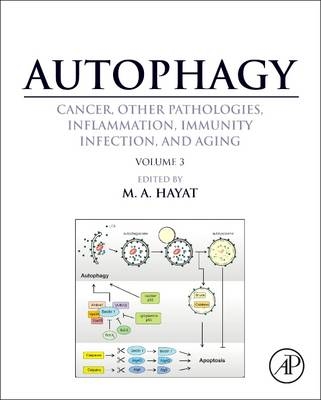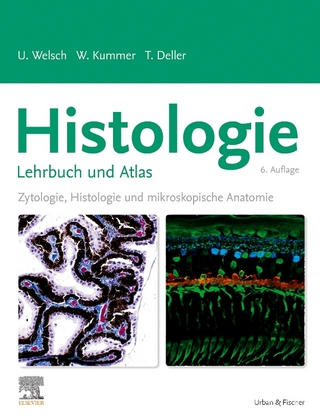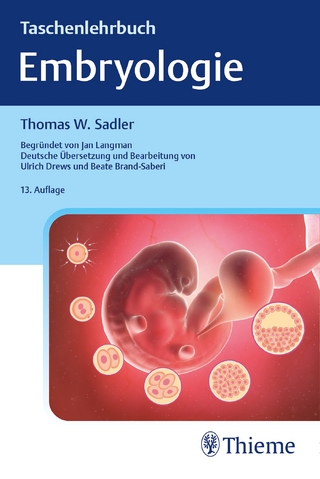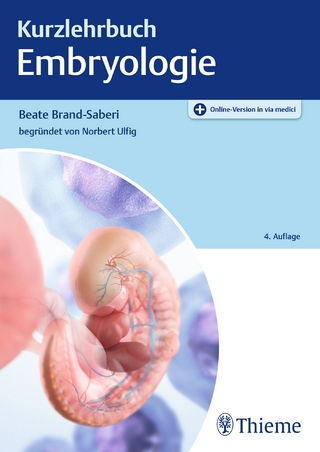
Autophagy: Cancer, Other Pathologies, Inflammation, Immunity, Infection, and Aging
Academic Press Inc (Verlag)
978-0-12-405529-2 (ISBN)
Understanding the importance and necessity of the role of autophagy in health and disease is vital for the studies of cancer, aging, neurodegeneration, immunology, and infectious diseases. Comprehensive and up-to-date, this book offers a valuable guide to these cellular processes whilst encouraging researchers to explore their potentially important connections.
Volume 3 explores the role of autophagy in specific diseases and developments, including: Crohn’s Disease, Gaucher Disease, Huntington’s Disease, HCV infection, osteoarthritis, and liver injury. A full section is devoted to in-depth exploration of autophagy in tumor development and cancer. Finally, the work explores the relationship between autophagy and apoptosis, with attention to the ways in which autophagy regulates apoptosis, and the ways in which autophagy has been explored in Lepidoptera, elucidating the use of larval midgut as a model for such exploration. From these well-developed foundations, researchers, translational scientists, and practitioners may work to better implement more effective therapies against some of the most devastating human diseases.
Volumes in the Series
Volume 1: Molecular Mechanisms. Elucidates autophagy’s association with numerous biological processes, including cellular development and differentiation, cancer, immunity, infectious diseases, inflammation, maintenance of homeostasis, response to cellular stress, and degenerative diseases such as Alzheimer’s, Parkinson's, Huntington's, amyotrophic lateral sclerosis, and prion diseases. Volume 2: Role in General Diseases. Describes the various aspects of the complex process of autophagy in a myriad of devastating human diseases, expanding from a discussion of essential autophagic functions into the role of autophagy in proteins, pathogens, immunity, and general diseases. Volume 3: Role in Specific Diseases. Explores the role of autophagy in specific diseases and developments, including: Crohn’s Disease, Gaucher Disease, Huntington’s Disease, HCV infection, osteoarthritis, and liver injury, with a full section devoted to in-depth exploration of autophagy in tumor development and cancer, as well as the relationship between autophagy and apoptosis.Volume 4: Mitophagy. Presents detailed information on the role of mitophagy, the selective autophagy of mitochondria, in health and disease, by delivering an in-depth treatment of the molecular mechanisms involved in mitophagy initiation and execution, as well as the role of mitophagy in Parkinson Disease, cardiac aging, and skeletal muscle atrophy. Volume 5: Role in Human Diseases. Comprehensively describes the role of autophagy in human diseases, delivering coverage of the antitumor and protumor roles of autophagy; the therapeutic inhibition of autophagy in cancer; and the duality of autophagy’s effects in various cardiovascular, metabolic, and neurodegenerative disorders.Volume 6: Regulation of Autophagy and Selective Autophagy. Provides coverage of the mechanisms of regulation of autophagy; intracellular pathogen use of the autophagy mechanism; the role of autophagy in host immunity; and selective autophagy. Volume 7: Role of Autophagy in Therapeutic Applications. Provides coverage of the latest developments in autophagosome biogenesis and regulation; the role of autophagy in protein quality control; the role of autophagy in apoptosis; autophagy in the cardiovascular system; and the relationships between autophagy and lifestyle. Volume 8: Autophagy and Human Diseases. Reviews recent advancements in the molecular mechanisms underlying a large number of genetic and epigenetic diseases and abnormalities, and introduces new, more effective therapeutic strategies, in the development of targeted drugs and programmed cell death, providing information that will aid on preventing detrimental inflammation.Volume 9: Necrosis and Inflammation in Human Diseases. Emphasizes the role of Autophagy in necrosis and inflammation, explaining in detail the molecular mechanism(s) underlying the formation of autophagosomes, including the progression of Omegasomes to autophagosomes.
Dr. Hayat has published extensively in the fields of microscopy, cytology, immunohistochemistry, immunocytochemistry, and antigen retrieval methods. He is Distinguished Professor, Department of Biological Sciences, Kean University, Union, New Jersey, USA.
1: INTRODUCTION
2: AUTOPHAGIC FLUX, FUSION DYNAMICS AND CELL DEATH
3: ARCHITECTURE OF THE ATG12-ATG5-ATG16 COMPLEX AND ITS MOLECULAR ROLE IN AUTOPHAGY
4: THE MOLECULAR MECHANISMS UNDERLYING AUTOPHAGOSOME FORMATION IN YEAST
5: ROLE OF AUTOPHAGY IN CELL SURVIVAL IN LIVER INJURY
6: POLYMORPHISMS IN AUTOPHAGY-RELATED GENES IN CROHN’S DISEASE: IMPACT ON INTRACELLULAR BACTERIA PERSISTENCE AND INFLAMMATORY RESPONSE
7: FUNCTIONAL RELEVANCE OF AUTOPHAGINS IN LIFE AND DISEASE
8: STRATEGIES TO BLOCK AUTOPHAGY IN TUMOUR CELLS
9: AUTOPHAGIC DYSFUNCTION IN GAUCHER DISEASE AND ITS RESCUE BY CATHEPSIN B AND D PROTEASES
10: CARGO RECOGNITION FAILURE UNDERLIES MACROAUTOPHAGY DEFECTS IN HUNTINGTON’S DISEASE
11: HEPATITIS C VIRUS INFECTION, AUTOPHAGY AND INNATE IMMUNE RESPONSE
12: GERANYLGERANOIC ACID INDUCES INCOMPLETE AUTOPHAGY BUT LEADS TO THE ACCUMULATION OF AUTOPHAGOSOMES IN HUMAN HEPATOMA CELLS
13: DEFENSE AGAINST PROTEOTOXIC STRESS IN THE HEART: ROLE OF P62, AUTOPHAGY, AND UBIQUITIN-PROTEASOME SYSTEM
14: ELIMINATION OF INTRACELLULAR BACTERIA BY AUTOPHAGY
15: PROTEIN PHOSPHATASE 2A HAS POSITIVE AND NEGATIVE ROLES IN AUTOPHAGY
16: ERUFOSINE INDUCES AUTOPHAGY AND APOPTOSIS IN ORAL SQUAMOUS CELL CARCINOMA: ROLE OF THE AKT-MTOR SIGNALING
17: EMERGING ROLE OF HYPOXIA-INDUCED AUTOPHAGY IN CANCER IMMUNOTHERAPY
18: INVOLVEMENT OF AUTOPHAGY AND APOPTOSIS IN STUDIES OF ANTICANCER DRUGS
19: AUTOPHAGY-BASED PROTEIN BIOMARKERS FOR IN VIVO DETECTION OF CARDIOTOXICITY IN THE CONTEXT OF CANCER THERAPY
20: INHIBITION OF MTOR PATHWAY AND INDUCTION OF AUTOPHAGY BLOCK LYMPHOMA CELL GROWTH: ROLE OF AMPK ACTIVATION
21: AUTOPHAGY REGULATES OSTEOARTHRITIS-LIKE GENE EXPRESSION CHANGES: ROLE OF APOPTOSIS AND REACTIVE OXYGEN SPECIES
22: THE KEY ROLE OF AUTOPHAGY AND ITS RELATIONSHIP WITH APOPTOSIS IN LEPIDOPTERAN LARVAL MIDGUT REMODELING
23: INTERFERON REGULATORY FACTOR 1 REGULATES BOTH AUTOPHAGY AND APOPTOSIS IN SPLENOCYTES DURING SEPSIS
24: THE INTERPLAY BETWEEN AUTOPHAGY AND APOPTOSIS
| Verlagsort | San Diego |
|---|---|
| Sprache | englisch |
| Maße | 191 x 235 mm |
| Gewicht | 950 g |
| Themenwelt | Studium ► 1. Studienabschnitt (Vorklinik) ► Histologie / Embryologie |
| Studium ► 2. Studienabschnitt (Klinik) ► Pathologie | |
| Naturwissenschaften ► Biologie ► Mikrobiologie / Immunologie | |
| Naturwissenschaften ► Biologie ► Zellbiologie | |
| ISBN-10 | 0-12-405529-X / 012405529X |
| ISBN-13 | 978-0-12-405529-2 / 9780124055292 |
| Zustand | Neuware |
| Haben Sie eine Frage zum Produkt? |
aus dem Bereich


